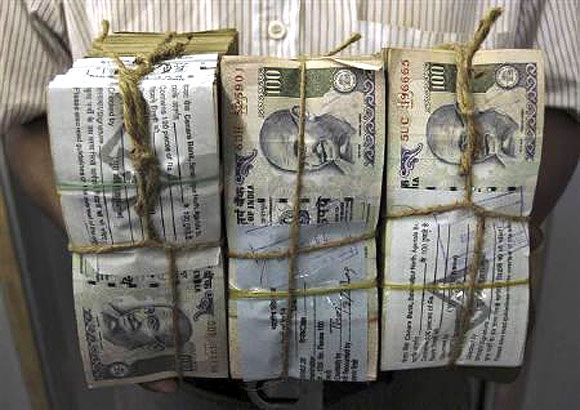 Even if RBI partially replaces the stock of the high value notes, RBI will have to incur thousands of crores of rupees in cost, say economists.
Even if RBI partially replaces the stock of the high value notes, RBI will have to incur thousands of crores of rupees in cost, say economists.
The removal of high value notes can have interesting consequences for the Reserve Bank of India policy as the huge accretion in deposits now will increase liquidity in the system and the central bank may have to do bond sales to suck out liquidity, instead of the present practice of buying bonds to aid liquidity, say economists.
RBI has bought bonds worth Rs 2.1 lakh crore in the past 12 months and the government plans to buy another Rs 15,000 crore of bonds this week. This, coupled with the deposit accretion in bank branches, will increase bank deposits substantially, say economists.
Even the decision on interest rate could be impacted as the increase in deposits will boost growth through cheaper loans and higher private and public investment growth, said State Bank of India’s group chief economist Soumya Kanti Ghosh.
RBI will have to publish enough Rs 100 notes and the cost on account of the extra printing too will be exorbitantly high. For the RBI, the cost of printing new currencies itself will be quite high. As per RBI, higher the value of the currency note, lower the cost-to face value to print the money. In absolute terms, it takes 96 paise to print a Rs 100 note, but only Rs 2.5 for a Rs 500 note and Rs 3.17 to print a Rs 1,000 note.
Even if RBI partially replaces the stock of the high value notes, RBI will have to incur thousands of crores of rupees in cost, say economists.
However, that would be a short-term pain. In the medium to long term, “currency in circulation will decline, bank deposits will shoot up, savings will increase, digital trends will take firm root and India will slowly move towards a cashless economy,” said Ghosh of SBI.
About 12-13 per cent of the banking system deposit is in cash in India, compared with only about 2-3 per cent in developed economy. “The black money move will lead to major disruption in the initial period. But it will have some positive impact on inflation because majority of transactions in the agri sector happens in cash mode,” said Madan Sabnavis, chief economist, Care Ratings.
“However, I do not think it will lead to any sharp increase in the GDP or impact anything else. I believe that the government should have given a longer time period for its implementation, perhaps a year or so,” Sadnavis said.
Soumyajit Niyogi, associate director of India Ratings and Research said the immediate reduction in money in circulation will push short-term yields up, and the central bank will have to announce enough term repos to address the extreme shorter end of the market. The yields on the longer term bond may rise too in the short term but will normalise after sometime.
The economist of a foreign bank who did not wish to be named said, “This is an ambitious plan which will cause major disruption in the near term. Yes, a lot of physical savings will move towards financial savings which has been coming down over the years. But it may not have any major impact on the economy or GDP.”











